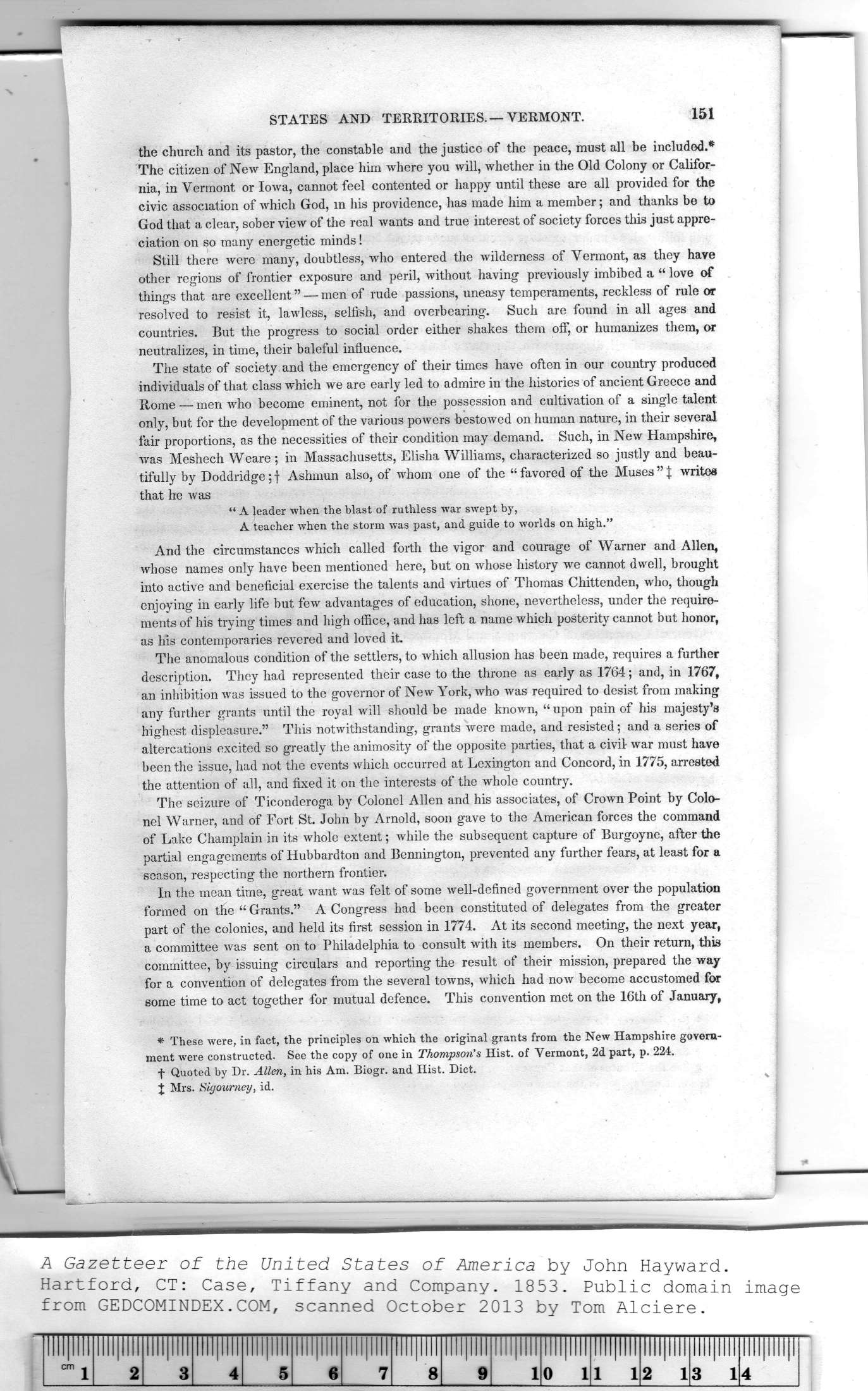|
|
Note: Ctrl and + increases the font size of the text below, Ctrl and - decreases it, and Ctrl and 0 resets it to default size.
STATES AND TERRITORIES. —VERMONT. 151
the church and its pastor, the constable and the justice of the peace, must all be included.*
The citizen of New England, place him where you will, whether in the Old Colony or Califor-
nia, in Vermont or Iowa, cannot feel contented or happy until these are all provided for the
civic association of which God, in his providence, has made him a member; and thanks be to
God that a clear, sober view of the real wants and true interest of society forces this just appre-
ciation on so many energetic minds!
Still there were many, doubtless, who entered the wilderness of Vermont, as they have
other regions of frontier exposure and peril, without having previously imbibed a “ love of
things that are excellent " — men of rude passions, uneasy temperaments, reckless of rule or
resolved to resist it, lawless, selfish, and overbearing. Such are found in all ages and
countries. But the progress to social order either shakes them off, or humanizes them, or
neutralizes, in time, their baleful influence.
The state of society and the emergency of their times have often in our country produced
individuals of that class which we are early led to admire in the histories of ancient Greece and
Rome — men who become eminent, not for the possession and cultivation of a single talent
only, but for the development of the various powers bestowed on human nature, in their several
fair proportions, as the necessities of their condition may demand. Such, in New Hampshire,
was Meshech Weare ; in Massachusetts, Elisha Williams, characterized so justly and beau-
tifully by Doddridge; f Ashmun also, of whom one of the “ favored of the Muses " j; writes
that he was
“ A leader when the blast of ruthless war swept by,
A teacher when the storm was past, and guide to worlds on high."
And the circumstances which called forth the vigor and courage of Warner and Allen,
whose names only have been mentioned here, but on whose history we cannot dwell, brought
into active and beneficial exercise the talents and virtues of Thomas Chittenden, who, though
enjoying in early life but few advantages of education, shone, nevertheless, under the require-
ments of his trying times and high office, and has left a name which posterity cannot but honor,
as his contemporaries revered and loved it.
The anomalous condition of the settlers, to which allusion has been made, requires a further
description. They had represented their case to the throne as early as 1764; and, in 1767,
an inhibition was issued to the governor of New York, who was required to desist from making
any further grants until the royal will should be made known, “ upon pain of his majesty's
highest displeasure." This notwithstanding, grants were made, and resisted; and a series of
altercations excited so greatly the animosity of the opposite parties, that a civil war must have
been the issue, had not the events which occurred at Lexington and Concord, in 1775, arrested
the attention of all, and fixed it on tire interests of the whole country.
The seizure of Ticonderoga by Colonel Allen and his associates, of Crown Point by Colo-
nel Warner, and of Fort St. John by Arnold, soon gave to the American forces the command
of Lake Champlain in its whole extent; while the subsequent capture of Burgoyne, after the
partial engagements of Hubbardton and Bennington, prevented any further fears, at least for a
season, respecting the northern frontier.
In the mean time, great want was felt of some well-defined government over the population
formed on the “ Grants." A Congress had been constituted of delegates from the greater
part of the colonies, and held its first session in 1774. At its second meeting, the next year,
a committee was sent on to Philadelphia to consult with its members. On their return, this
committee, by issuing circulars and reporting the result of their mission, prepared the way
for a convention of delegates from the several towns, which had now become accustomed for
some time to act together for mutual defence. This convention met on the 16th of January,
* These were, in fact, the principles on which the original grants from the New Hampshire govern-
ment were constructed. See the copy of one in Thompson's Hist, of Vermont, 2d part, p. 224.
f Quoted by Dr. Allen, in his Am. Biogr. and Hist. Diet.
J Mrs. Sigourney, id.
|
lllllllll |
lllllllll |
lllllllll |
lllllllll |
lllllllll |
lllllllll |
lllllllll |
llll|llll |
llll|llll |
lllllllll |
lllllllll |
lllllllll |
lllllllll |
lllllllll |
llll|lll!|l |
|
"1 |
2 |
3 |
4 |
5 |
6 |
7 |
8 |
9 |
1 |
0 1 |
1 1 |
2 1 |
3 1 |
4 |
|
